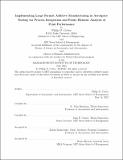Implementing Large Format Additive Manufacturing in Aerospace Tooling via Process Integration and Finite Element Analysis of Print Performance
Author(s)
Cotter, Philip D.
DownloadThesis PDF (23.25Mb)
Advisor
Hansman, R. John
Carrier, John F.
Terms of use
Metadata
Show full item recordAbstract
Ascent Aerospace (Ascent) designs and manufactures a diverse array of customized aerospace tooling, creating a low-volume/high-mix production environment where precision is critical. As a result, Additive Manufacturing (AM)—and, more specifically, Large Format Additive Manufacturing (LFAM)—stands to provide Ascent a significant competitive advantage by reducing lead time, cutting costs, and enabling the rapid production of novel tooling solutions. This project explores the integration of the Large Scale Additive Manufacturing Machine (LSAM) into Ascent’s production processes with the goal of maximizing the technology’s value impact. To this end, it focuses on two components: understanding, controlling, and planning the production of LSAM-printed tools, and simulating the behavior of LSAM-printed tools to better predict their performance.
First, a framework for the operational integration of the LSAM is developed. Comparison of traditional (current state) and LSAM-specific (future state) process maps provides a means to identify and address probable bottlenecks. Next, a test plan is described enabling a clear understanding of the LSAM’s capabilities and limitations. From these findings, Design for LSAM (DfLSAM) Guidelines and various other continuous improvement initiatives are motivated and codified.
Next, this project develops an approach to the Finite Element Analysis (FEA) of LSAM-printed objects. Current design principles are largely rooted in empirically calibrated processes which require extensive trial and error. Due to the size of LSAM prints, this approach can be expensive and unscalable. The FEA approach presented herein begins with characterization of material properties of a common carbon fiber reinforced ABS feedstock. Based on these inputs, various modeling approaches are explored for this anisotropic, composite material. Model outputs are then validated against the results of physical experiments. An orthotropic solid modeling approach is shown to compare best with physical reality, suggesting a promising direction for further development.
Organizational impacts and change management are considered throughout this document. Future directions of both the integration and modeling work are also discussed. These findings, abstracted from Ascent, comprise a framework for the implementation of LFAM in manufacturing operations.
Date issued
2021-06Department
Massachusetts Institute of Technology. Department of Aeronautics and Astronautics; Sloan School of ManagementPublisher
Massachusetts Institute of Technology